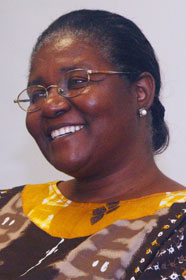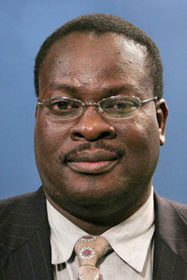The United Methodist Church in Africa is growing, but the number of trained and licensed clergy is not keeping pace.
In addition, money allocated for African theological education has been slow to filter down.
General Conference, the denomination's policy-making body, approved the Africa Educational Initiative in 2008. The United Methodist Board of Higher Education and Ministry, the Board of Global Ministries and United Methodist Communications agreed to provide $2 million to support the initiative.
The initiative calls for each of the 12 African bishops to receive $100,000 for scholarships and logistical support to educate clergy in each episcopal area. But so far only $20,000 has been distributed. Liberia Bishop John Innis used those funds to send four students to Africa University in Mutare, Zimbabwe.
"We've been slow to get off partly because we haven't received many applications and partly because the applications we have received haven't been complete," said John Lesesne, the higher education agency's chief financial officer and interim top executive.
A great need
During the Council of Bishops' gathering last week, Lesesne met with the African bishops to urge them to take advantage of a simplified application form. He also encouraged the bishops to use $520,000 originally designated for an endowment to support immediate education needs.
The higher education agency is also developing resources in the three major languages of the continent, English, French and Portuguese. Plans call for the development of professional and institutional associations for theological educators on the African continent.
The need is great, church officials said.
"We have a number of congregations with untrained pastors," said Mozambique Area Bishop Joaquina Felipe Nhanala. "Most of the churches in Mozambique are led by lay people, and those leaders need theological training. It is important that those leaders be prepared to teach the gospel in a good way."
Being in true connection
In Liberia, Innis said, most of the area's 900 pastors have at least a bachelor's degree in theology. Liberia also has Course of Study schools where pastors in rural areas can receive training.
Innis plans to use the balance of his allotted theological funding to help 22 students attend a master of theology program at an Episcopal university in Monrovia, Liberia, and help other students complete their education at Saint Paul School of Theology, a United Methodist school in Kansas City, Mo., and Oklahoma City.
But in East Africa, which includes Burundi, Kenya, Rwanda, Sudan and Uganda, some of the people who lead congregations have not even completed elementary school, said Bishop Daniel Wandabula. The East Africa bishop hopes to launch programs where church leaders can receive basic Bible education.
Ultimately, the goal is to have church leaders who can minister in their contexts but still have a solid understanding of Wesleyan teachings, Wandabula said.
"To be in true connection, we need to share the same theology," he said.
Lesesne expects providing the infrastructure to educate African church leaders will require more than $2 million. He hopes to obtain more funds from the 2012 General Conference.
"We have to be able to tell our story," he told the bishops, "because the need is so great."
*Hahn is a multimedia news reporter for United Methodist News Service.
News media contact: Heather Hahn, Nashville, Tenn., (615) 742-5470 or newsdesk@umcom.org.
Related Articles
Board Meets in Nashville, Approves Changes
Bishops break new ground at Africa University
Africa University leaders pledge to serve continent
Black colleges seek stronger partnership with African education
Resources
United Methodist Board of Higher Education and Ministry
Like what you're reading? Support the ministry of UM News! Your support ensures the latest denominational news, dynamic stories and informative articles will continue to connect our global community. Make a tax-deductible donation at ResourceUMC.org/GiveUMCom.






